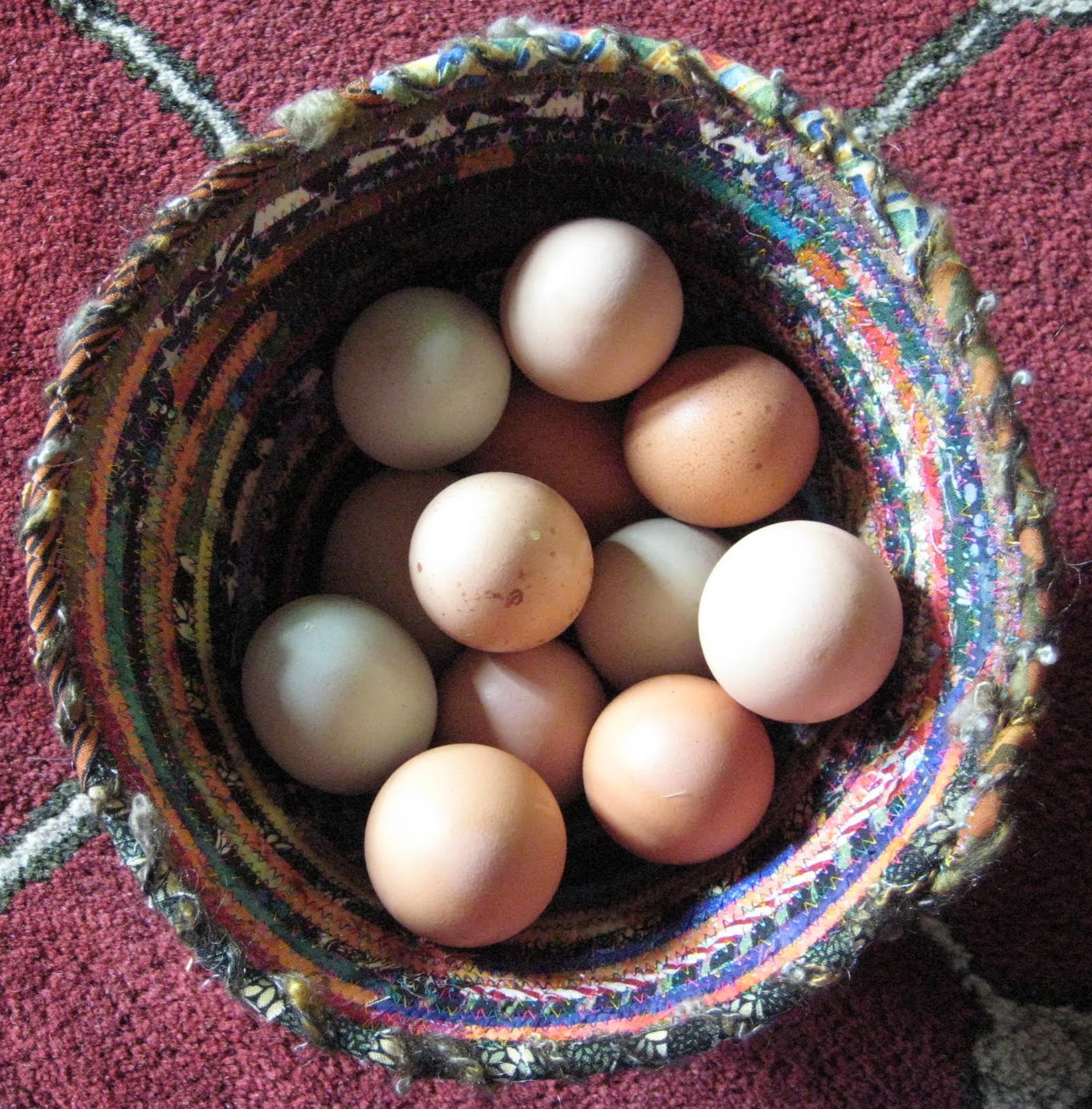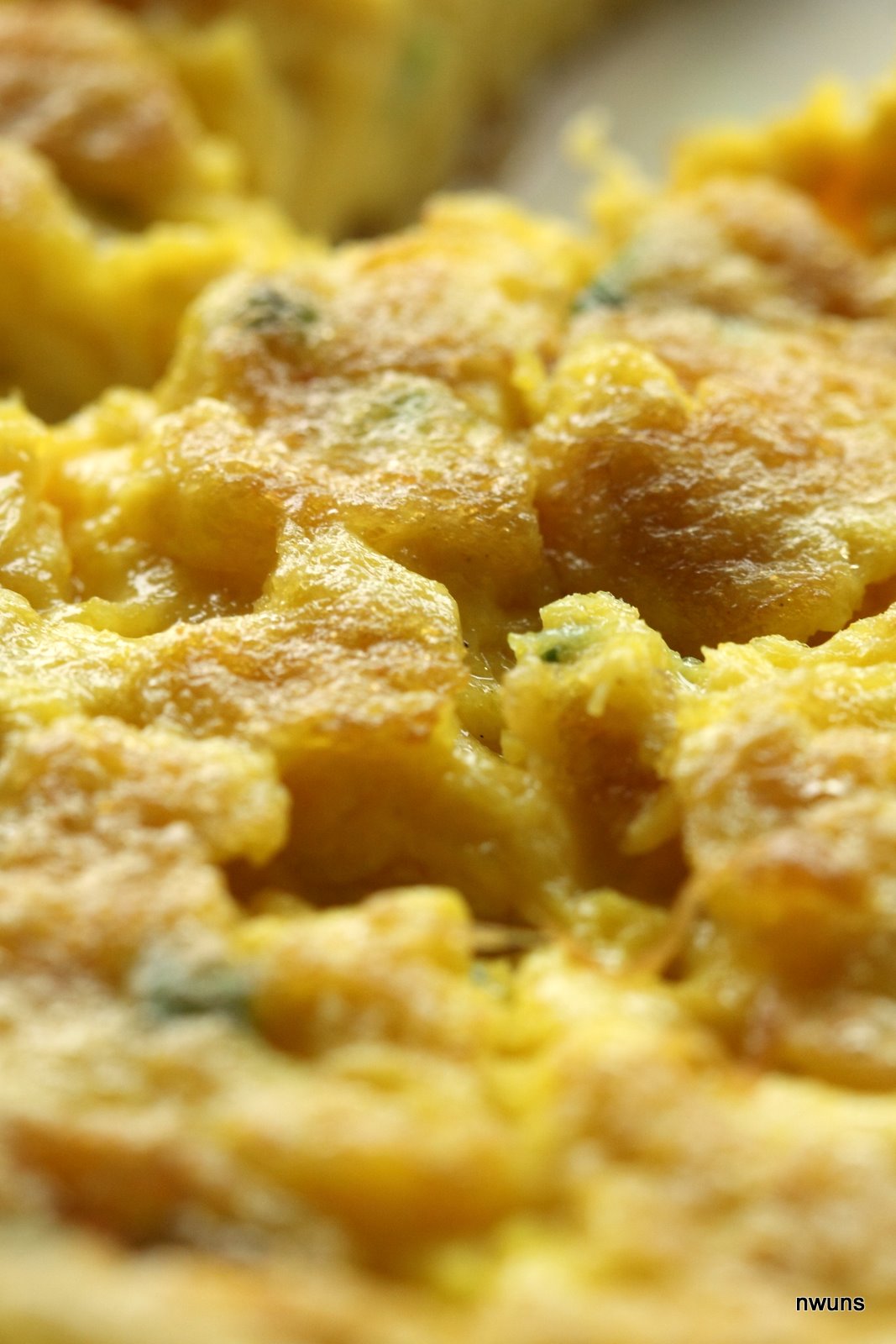We started by making chocolate chip cookies, and I loved the idea that you could take several different things, mix them up, and they would magically turn into something else. We had taken it slowly, step by step, my mother watching as I carefully measured and poured the flour and sugar, and even letting me stir the batter until my arms got too tired.
The next morning, I was eager for more kitchen wizardry. “Mommy, how do you make eggs?”
Ever obliging, she pulled a chair up to the counter and invited me to stand on it so I could watch and learn while she made breakfast.

Crack-crack-crack went the eggs on the side of the bowl. I watched the yolks pour out of the shells and float like little golden islands in a sea of egg white.
My mother pulled out a fork and started furiously beating the eggs in the bowl.
“Can I try?” I asked.
She handed me the fork, but all I could do was impotently stir it around in the bowl. I looked up at her questioningly.
“You have to do it really fast, Mae-Mae, and you shouldn’t really be stirring. Watch me in slow motion.” She lifted the fork a half an inch above the liquid and then plunged it back in. She started off very slowly, and got faster and faster, until all I saw was a vertical fork-colored oval shape rising out of the frothy eggs.
I giggled.
She handed me the fork again, and this time, she moved my hand to show me how to do it. I could make the motion now, but I was not nearly as fast as she was. I was upset that I couldn’t blur the fork, but she said that I didn’t have big mommy muscles, so of course I couldn’t go as fast as she could.
When the yolks and whites had blended into a lovely yellow mix, my mother announced, “Now we add the special stuff.”
She directed me to sprinkle chives into the bowl as she added a dollop of milk to our concoction (“to thicken it up,” she insisted). Mix-mix-mix went the fork, and at last it was time to heat up the pan.
She dropped a tablespoon of butter into the heavy cast-iron skillet, and I watched the creamy square bubble and sizzle as it melted. She picked up the pan by the handle and angled it this way and that so that the butter could slide all over the skillet (“No, no,” she warned, “only strong mommies should pick up the pan.”). It was important, she explained, that we cover the whole bottom because we didn’t want the eggs to stick.
“And now,” she declared, “it is time to cook the eggs.”
I watched, enthralled, as the golden liquid poured out of the bowl and began to coalesce into solid form before my very eyes. My mother began to quickly move the eggs around with a spatula, telling me that this is why they’re called scrambled eggs, because she’s scrambling them around the pan.
And then, to my dismay, I felt the call of nature.
When you’re six, and you get that urge, you don’t have a lot of time before it turns into an accident. “Mommy, I have to go to the bathroom. Can you wait for me?”
“Okay, sweetie.” She continued working on the eggs as I raced to the potty.
When I returned, refreshed, I was very disappointed to find that my mother had finished making the eggs; they were now on my plate at the kitchen table.
I had wanted her to wait for me. I had expected that she’d be able to stop cooking, to pause as if on a tape, and pick up exactly where we had left off. I began to whine.
My mother looked at me. “Eggs wait for no man,” she declared with a flourish. “Now eat them before they get cold.”

That simple sentence meant more to me than my mother ever thought it would.
It was the first time I realized that the world didn’t revolve around me, that things would continue to happen whether or not I was in the room or observing them. My world suddenly got much, much larger, and I was ready to accept that reality.
Eggs wait for no man. Once a physical reaction is set into motion, it is difficult to slow or stop it, and almost impossible to undo. There’s no use bemoaning the past; just make sure your eggs don’t burn, and enjoy them before they get cold.
So, while some people might compare life to a box of chocolates or a bowl of cherries, I say life is like a plate of eggs. Scrambled, poached, or sunny-side up, those eggs are the irrefutable result of change.
And I think change can be deliciously good.
This week’s Indie Ink Writing Challenge came from Jen O., who gave me this prompt:
Reflect for a moment on how something from your very early childhood, seemingly menial at the time – a television program, something you overheard an adult say, etc – came to affect you profoundly in your adult life. If you can’t think of anything appropriate, this can be fiction.
Jen O. gave me another prompt a couple weeks back; you can read that response here.
You can read Karla V.‘s response to my challenge here by the end of the week.

That was really sweet! I really enjoyed the way you took the challenge and ran with it!!
Wow. That doesn’t do justice to your writing but it’s the only word that my tiny brain can muster up right now. Just wow. Truly amazing. Thank you for the welcome and I can’t wait to read more of your work. It’s truly just wow. nnDafeenah
Eggs wait for no man! What a brilliant line. It says everything and your piece did a fantastic job of capturing that sentiment.
i don’t even like eggs but now have a serious hankering. thanks a lot for that.nalso, those little moments in the life of a child, the ones that they remember forever? whoosh.
I especially like your use of the generic “man” instead of the politically correct “personage of unspecified gender.” Besides the fact that it’s probably what your mom actually said, it also makes it flow a little easier. And seriously, I think I once (at least!) told you how the word “man” in Old English was without gender. Gender was specified by the prefixes “wer” and “wif.” See http://www.etymonline.com/index.php?term=man. Hey, man, I’m only the messenger here. Anyhow, thanks for a sweet bit of time travel.
That is such a sweet moment between mother and daughter. I spend a lot of time in the kitchen with my little girl as well and now I will always wonder if one of my lessons might be learned over a plate of eggs. I try really hard to “make great memories” for her but I think you just perfectly demonstrated that the most remembered moments come from unexpected sources.
I learned how to cook and bake by watching my grandmother and asking questions. Among the many things she taught me, those are two of the most important (and rewarding). This was a wonderful reflection on a lovely memory.
You’ve made me SO hungry!! LOL! DAMN YOU!! nnSeriously, a beautiful snapshot from your childhood!
Such a touching story. I am always saddened that my mother never taught me to cook. Now if I could just figure out how to teach my boys that same lesson while cooking they will be set!